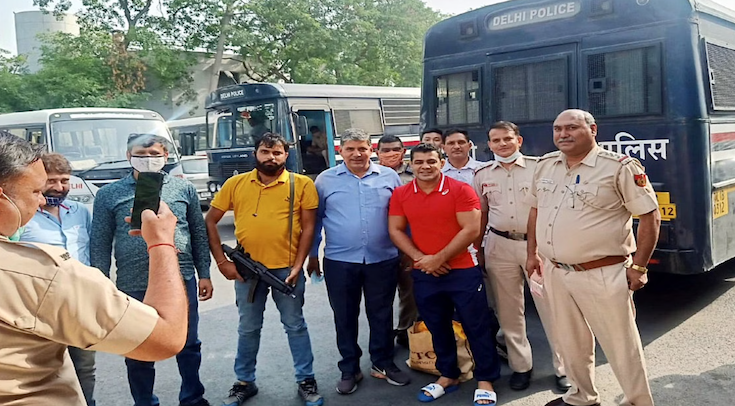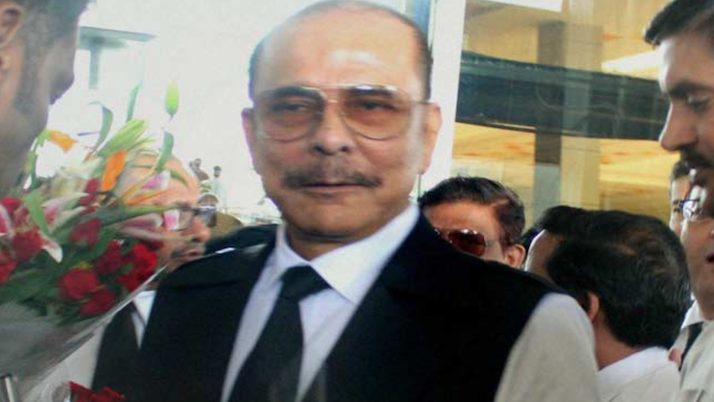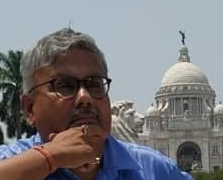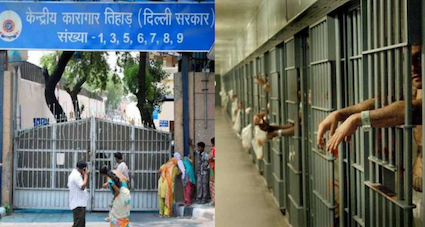Every evening, big iron doors lock with clockwork precision at Tihar Jail, reminding inmates that the lives they once led outside can never be replicated in Delhi’s maximum-security prison.
Prisoners know how dire life can be behind bars. Rich and famous inmates often demand additional space and special facilities. Some are granted, rest denied.
“It is a big blow to their ego. The jail breaks their confidence. The rich virtually collapse, even weep bitterly. Sometimes they try to hide in corners only to realise they are not alone in the cells. Many are watching them,” says a former jailor.
India’s jails and detention centres are not known as reform homes, although some open jails have sprung up in some corners of the country. Largely, jails are dangerous places in India.
The former jailor, who sat down for a detailed interview, says Tihar makes the headlines because it is in the national capital. Mumbai’s Arthur Road Jail is equally hard on prisoners, famous or infamous. “Tihar is a five-star property compared to Arthur Road Jail,” he says.
Tihar is cramped, and social distancing is not an option. Bizarre stories fill the jail compound.
In a secluded corner of the cells meant for female prisoners, former National Stock Exchange (NSE) CEO Chitra Ramakrishna spends her day in prayer. She is often joined by other female inmates who have turned to god in jail, like her.
Her former colleague and NSE COO, Anand Subramanian, teaches English to prisoners.
It is a unique reversal of roles.
Subramanian was described by Ramakrishna as the mysterious Himalayan yogi who guided her in taking major calls to shape the fortunes of NSE.
“The ‘yogi’ is not into prayer. He is more into academics. The inmates love his classes,” says a top source at Tihar.
When Ramakrishna was NSE CEO, visitors would have to wait for hours to meet her. But in jail, it is an open-door policy. When the doors are about to close, she goes back to her cell. When the doors open, she ventures out briefly. She does not spend long hours in the open, and returns to her cell to resume her prayers.
She has told her fellow inmates that prayers are helping her stay strong.
Tihar’s rich inmates buy their peace, perks, and private space with cash provided by their lawyers, or visitors. Privileges include special beds, private toilets, masseurs, and the occasional mobile phone for a quick chat.
Consider the case of Sanjeev Chawla, a businessman extradited from London on charges that he fixed cricket matches between India and South Africa. He was in for a shock when he walked into Tihar.
Top sources say Chawla, who allegedly fixed matches using his proximity with late South African cricketer Hansie Cronje, was lucky because the UK Court that agreed to his extradition had set some stringent rules for officials in Tihar. Hence his facilities were better than what others manage.
Chawla, who got bail this April, was kept in a separate cell, and his health was monitored regularly. But the perks did not bring him peace. He remained tense throughout his time in Tihar, and spoke only to a handful. He knew that in any jail in India, violence is par for the course and very few would care about accountability.
“He knew he was virtually on his own. There was palpable fear on his face. Tihar has many cricket bookies and fixers. Chawla could keep away from them because his lawyers told jail officials about the rights guaranteed to him by the UK court. So there was a thin line that kept him safe,” sources told this reporter.
A seasoned lobbyist who also spent time in Tihar helped Chawla regain his confidence and made him at ease inside the jail. “He slowly started moving out of his cell, and began interacting with a handful of prisoners.
“I often spoke to him. He talked about his case and how for 20 long years it did not move an inch,” the source added.
When Chawla got bail, Justice Asha Menon of the Delhi High Court told Delhi police that it was imperative for the cops and the jail authorities to use GPS tracking systems like those used in the US to track under-trial prisoners.
“All rich and influential prisoners are not as lucky as Chawla,” said a jail official.
Wave group vice-chairman Manpreet Chadha spent considerable time at the jail hospital because he was unwell and in a state of shock. He had a nervous breakdown the moment he entered Tihar. “He just could not imagine that he was in jail when he was supposed to fly business class to Bangkok,” said sources.
Chadha, known for his fancy cars and lavish lifestyle, was booked after cases were filed against him by those who had paid the Wave Group for homes but did not get delivery of their apartments. Delhi Police’s Economic Offences Wing (EoW) estimated the fraud at Rs 100 crore.
Currently abroad, Chadha was lucky to have spent a significant amount of time in the jail hospital while at Tihar. “He just could not accept the fact that he was sharing space with fellow prisoners,” the sources said.
Chadha’s home in DLF Chattarpur Farms is spread over three acres, decorated with Belgian marbleware and gigantic chandeliers. He was shocked to see Tihar’s un-glamorous, torturous, and dangerous lifestyle. Here, he shared his space with others in a concrete cell with solid steel doors and built-in showers.
Former Religare promoters Malvinder and Shivinder Singh, once listed by Forbes as one of India’s top billionaires, continued to make headlines in spite of being in jail. The brothers stay and work together in Tihar. They have turned spiritual, and rarely talk to fellow inmates. Both spend long hours in prayer, and routinely join religious discourses inside the jail.
The brothers know they are in a jail for three long years, and Tihar is not designed for humanity, nor is it designed for rehabilitation.
“Many line up outside their cell every now and then, hoping to tell the brothers that they have strong connections with top ministers and bureaucrats who could guarantee their bail,” the sources say.
But it does not cut any ice.
In the waiting room at the court, the brothers stay put with other influential prisoners. What is interesting is that they remain totally calm even when approached by someone or the other.
“Everyone talks about their connections, saying they can help, but the brothers just do not respond,” say the sources.
Probably it is because their family members were cheated by one Sukesh Chandrasekhar, who, along with his friends, took a large sum of cash from their wives, promising to secure them bail.
Once court proceedings end, the Singh brothers are taken, along with other prisoners including hardened criminals, to the waiting room, and then driven to prison in rickety vans.
Once, a team of 15 secretaries would keep manage their lives, they would travel in expensive cars. Inside Tihar, the brothers have witnessed gang fights, violence between guards and inmates, and also between inmates themselves. They have seen drugs being used.
The brothers have been in jail since October 2019, when they were arrested for allegedly diverting funds worth Rs 2,397 crore from Religare Finvest and its parent firm Religare Enterprises. Many say that is just the tip of the iceberg. According to reports, the brothers have managed to squander a whopping Rs 22,500 crore over just a decade.
Olympic medalist Sushil Kumar, lodged in Tihar on a murder charge, has acquired a bunch of followers who are fans of his daily workout regimen. Kumar has not demanded any special food but his fans ensure he is given something extra every now and then. “Some of Kumar’s friends work in the kitchen and routinely manage some extra meals,” says the former jailor.

Unitech promoters Ajay and Sanjay Chandra, jailed on charges of money laundering, were once boisterous inside the prison but quietened down after it was revealed that they were trying to bribe jail officials for special favours. Both Ajay and Sanjay do various odd-jobs in prison and are kept under strict watch.
“It is not easy to maintain constant watch,” says the former jailor.
The former jailor said there were times when Vikas Yadav, convicted along with his cousin and friend for brutally murdering business executive Nitish Kataria, would seek permission to visit the All India Institute of Medical Sciences. And then he would routinely disappear from there.
Others are not that lucky. Sushil Sharma, who served close to 23 years in Tihar on charges of murdering his wife Naina Sahni and burning parts of her body inside an oven, tried to commit suicide on a number of occasions. Sharma, whose failed marriage led to the murder, counselled young inmates on how to keep their marriages intact.
Strange transformations happen inside the prison.
Old-timers remember the curious case of one Rekha Mirchandani, a beautiful air-hostess arrested for smuggling gold under COFEPOSA in 1988, and brought to Tihar. Within hours, she was in a special cell with notorious smuggler and murderer Charles Sobhraj.
Asked why she chose Sobhraj’s cell, she said that that was the best way to avoid getting raped in jail. Within six months, she was out of Tihar. Rumours flew thick and fast that she was released because of her proximity to a top cabinet minister.
Tihar also hosted India’s top smuggler, Amrit Lal Seth, who was arrested from Hyatt Regency hotel by Directorate of Revenue Intelligence (DRI) officers. When arrested, the officials found handwritten notes from India’s top lawyers and two cabinet ministers suggesting ways that he could circumvent the law.
Tihar officials had a tough time controlling him inside the prison, as Seth used his tremendous influence to routinely break rules.
And there was the king of all, Sahara Sri Subroto Roy, who ran an office from inside the jail because he was allowed to by the Supreme Court. A special room was allotted to Roy and two of his directors, who were also jailed.

Outside his cell, Roy behaved as if he was in Sahara City, at his huge palace in Lucknow that many compare with the proverbial Xanadu.
“But when locked inside the cell every evening, they (Roy and his two directors) realised they were inside Tihar,” said a former jailor.
(Shantanu Guha Ray, a Wharton-trained journalist, is the Asia Editor of Central European News & Zenger News and an award-winning author. He won the 2018 Crossword award for his book, Target, which probed the NSEL payment crisis.)



